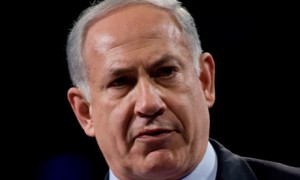
The last week must rank as the worst of Binyamin “Bibi” Netanyahu’s second term as Israeli prime minister. It produced headlines no leader would want to read, even allowing for the sometimes excitable tone of the Israeli press: “Ambush in the White House”, “A hazing in stages” and “With his back to the wall.”
Netanyahu flew to Washington a week ago hoping to mend fences after an extraordinary rupture in relations but found only a frosty reception. Then Britain expelled an Israeli diplomat from London in anger at the “intolerable” forging of British passports for the hit squad who assassinated a Hamas man in Dubai. Hours later Netanyahu had a low-key meeting with Barack Obama that ended in serious disagreement and without the usual courtesy of a photographed handshake.
Perhaps it was inevitable that an American president who gave such a firm commitment to tackling the Middle East conflict so early in his term would eventually run up against one of the most rightwing coalition governments in Israel’s history.
Some in Israel are encouraged by the Obama administration’s strong words and its continued pressure for a halt to Jewish settlement-building in East Jerusalem. In its weekly newspaper advert on Friday, the peace group Gush Shalom pleaded with Obama: “Now heal us please from the malignant occupation. Many in Israel will be grateful.”
But this is not a majority view. More common is the sense that the world does not understand or sympathise with Israel, a feeling summed up by one Israeli newspaper columnist who wrote: “The US is abandoning us and effectively turning into Europe. From now on, we are completely alone.” Two opinion polls suggest many Israelis want their government to continue building settlements in East Jerusalem, even if it brings a rift with the Americans.
For years US governments have called on Israel to stop expanding its Jewish settlements in occupied territory – a settlement freeze is even a key plank of the roadmap introduced during the Bush presidency. But it is the Obama administration that has pushed hardest on it, so far without success. Netanyahu has introduced a partial, temporary curb on building in the West Bank, but insists building will continue in Jerusalem. “Jerusalem is not a settlement. It’s our capital,” he said. It is not the view of the international community, which does not recognise Israel’s occupation and annexation of East Jerusalem in the wake of the 1967 war.
Netanyahu’s position, together with his heavily circumscribed vision of a future Palestine, has meant no return to peace talks. But the more settlements are built and serious negotiations avoided, the less possible any conflict-ending, two-state peace deal becomes. And the fate of Jerusalem in particular is crucial to a broader agreement.
For now Netanyahu’s coalition is in robust form, unusually so for an Israeli government, and is backing its prime minister. But soon, like others before him, he may find himself forced to choose between maintaining the relationship with Israel’s greatest ally, the Americans, or maintaining the loyalty of his coalition, without whom he would be lost. Guardian

Leave a Reply
You must be logged in to post a comment.